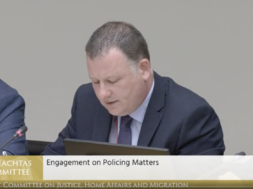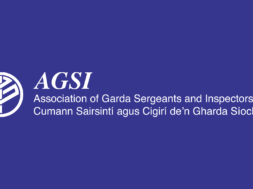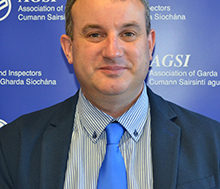Minister Shatter publishes report of the Garda Síochána Inspectorate and announces Action Plan to implement Report’s Recommendations
Copy of report available at http://www.gsinsp.ie
Key Points:
· Minister Shatter, on 14 May 2013, referred to the Garda Inspectorate the O’Mahoney Report and the Garda Siochana Professional Standards Report and asked the Garda Inspectorate to carry out a full review of the Fixed Charge Processing System, taking into account both reports and the recommendations contained in them.
· The Minister asked the Garda Inspectorate to make any further recommendations they considered appropriate with a view to enhancing the efficiency and effectiveness of the operation by An Garda Síochána of the fixed charge processing system, and to review their implementation after 18 months.
· The Minister today brought the Garda Inspectorate Report to Cabinet and all of the recommendations it contains have been agreed by Government.
· An Action Plan, agreed with the Garda Commissioner, for the implementation of the recommendations has been drawn up and agreed by Government (the full Action Plan is contained in this statement)
· The Criminal Justice Working Group recommended by the Garda Inspectorate will hold its first meeting tomorrow, Thursday, 13 March 2014.
The Minister for Justice and Equality, Alan Shatter TD, having, on 14 May 2013, referred to the Garda Inspectorate the O’Mahoney Report into allegations of irregularities in the operation of the fixed charge processing system and the related report by the Garda Síochána Professional Standards Unit, today published the Inspectorate’s Report and announced an Action Plan for a radical overhaul of the Fixed Charge Processing system
The Minister said “Having considered the findings of Assistant Commissioner O’Mahoney’s Report and the Report of the Garda Síochána Professional Standards Unit, I published both reports on 15 May 2013 and set out seven key principles which I believed should inform the operation of the Fixed Charge Processing System:
1. There must be no question mark hanging over the integrity of the Fixed Charge Notice system and in the application of penalty points.
2. No individual should receive preferential treatment because of their perceived status, relationship or celebrity.
3. The law and any discretionary application of it to individuals must be administered fairly, with compassion and common sense.
4. No member of the Garda Force should feel compelled by a person’s position, relationship or celebrity status to treat that person any more or less favourably than any other person.
5. There must be proper oversight and transparency to the discretionary decision making process and the applicable rules and procedures must be fully complied with.
6. All statutory provisions, regulations, rules, protocols and procedures applicable to the termination of Fixed Charge Notices must be readily accessible to all members of the Garda Force and the circumstances, factors and procedures applicable to the termination of Fixed Charge Notices should be detailed clearly on the Garda website for the information of members of the public.
7. Where application is made to terminate a fixed ticket charge, where possible and appropriate, material to support any application made should be sought while understanding in some circumstances no such material may exist or be obtainable.
Minister Shatter continued “It was clear to me that an independent review of the Fixed Charge Processing System was necessary to ensure that no similar difficulties arose in the future. I referred both reports to the Garda Inspectorate to carry out such review taking into account both reports and the recommendations contained in them. I also asked the Garda Inspectorate to make any further recommendations they considered appropriate with a view to enhancing the efficiency and effectiveness of the operation by An Garda Síochána of the Fixed Charge Processing System, and to review their implementation after 18 months. I welcome and thank the Inspectorate for their very comprehensive report and its recommendations.”
Findings of the Garda Inspectorate
The report by the Garda Inspectorate, which looks organisationally at the FCPS as a whole rather than at individual allegations, finds that the system has significant deficiencies which need to be corrected. In short, it finds that there are technical, administrative and management problems which have built up over the years, and that the system needs to be overhauled through a co-ordinated process involving all the stakeholders.
The report is critical of the management of the FCPS, finding consistent and widespread breaches of policy by those charged with administering the FCPS, with no meaningful evidence of consistent quality management supervision of the cancellation process and is critical of decisions made.
Recommendations of the Garda Inspectorate
The report makes a total of 37 recommendations. In making its recommendations, the Inspectorate, mindful of resource constraints, divides the recommendations into those that are achievable now and those that can be implemented in the medium to longer term. The Garda Inspectorate acknowledges that many of its recommendations support similar recommendations made in the O’Mahoney Report and in the Comptroller and Auditor General report. It also recommends that the Department of Transport, Tourism and Sport address legislative deficiencies relating to the Road Traffic Acts to ensure greater efficiency in the collection of charges and the imposition of penalty points.
The key recommendations deal with issues such as:
· Better training on the policy and procedures of the FCPS;
· Regular audit checks on the operation of the FCPS;
· The centralisation of responsibility within the Garda Síochána for the operation of the FCPS
· Enhanced administrative procedures for processing fixed charge notices and addressing any processing difficulties;
· A review of the summons serving process;
· Legislative change to address difficulties in issuing fixed charge notices in respect of company vehicles, hired vehicles and unregistered vehicles;
· New procedures to ensure that all penalty points are applied to driving licences;
· Legislative change to provide clear parameters on the use of Garda discretion in cancelling fixed charge notices;
· Authority to cancel fixed charge notices to be centralised in the Fixed Charge processing office;
· Information to be made publicly available on the procedures for seeking the cancellation of fixed charge notices;
· Medium term recommendations on the introduction of a new bar coded pre-summons for recording and serving notice of a fixed charge offence, and the introduction of hand-held electronic devices capable of populating and printing these pre-summonses;
· A longer term recommendation on the development of a technologically advanced system which would minimise human resource requirements and maximise efficiencies.
The report also recommends that a Criminal Justice Working Group should be established consisting of the Department of Justice and Equality the Department of Transport, Tourism and Sport, the Garda Síochána, the Courts Service and the Road Safety Authority, to oversee and facilitate the implementation of the recommendations.
Action Plan
Action to be taken immediately
The Minister is making immediate arrangements, in consultation with the Minister for Transport, Tourism and Sport, to establish the recommended Criminal Justice Working Group, to be chaired jointly by the Department of Justice and Equality and the Department of Transport, Tourism and Sport, to oversee and facilitate the implementation of the recommendations in the report. The Groups first meeting will take place on Thursday, 13th March 2014.
Action already taken or commenced by An Garda Síochána
· The Fixed Charge Processing Office has been given full responsibility for the administration of the National Tracking Allocation System (rec. 2.4)
· A new and robust process for managing “sendbacks” has been introduced (rec. 2.5)
· Monthly audits are undertaken in relation to the operation of the FCPS (rec. 2.3(a))
· A review of the summons serving process has commenced (rec. 2.7)
· The necessary equipment for an electronic document scanning and management system in the Fixed Charge Processing Office has been procured (rec. 2.8)
· The PULSE access registered number of a member of the Garda Síochána is now deactivated when he or she retires or leaves the Force (rec. 3.1)
· Previous cancellations are now considered when a new petition for cancellation in relation to the same driver and vehicle is made (rec. 3.6)
· Work has commenced on new procedures to notify District Officers of the detection of relevant road traffic offences by members of An Garda Síochána, and this will be provided for in the new consolidated manual (see below) (recs. 3.4 & 3.5)
Action to be taken by An Garda Síochána within 6 – 8 weeks
An Garda Síochána will:
· Subject to consultation with the Director of Public Prosecutions, produce the recommended consolidated manual on the FCPS, reflecting recommendations in the report (rec. 2.1)
· Ensure full compliance with the timeframes laid down in the manual (rec. 2.6)
· Provide in the manual for cancellation petitions to be accompanied by factual third party evidence (rec. 3.9)
· Make information available to the public, on the Garda website, in relation to the policy on the cancellation of fixed charge notices (rec. 3.10)
· Provide for cancellation requests to be made on a cancellation form, which will be publicly available (rec. 3.11)
· Commence arrangements for the centralisation in the Fixed Charge Processing Office of authority to cancel fixed charge notices (rec. 3.8)
· Amend the HQ Directive of 30 August 2013 to reflect the centralisation of the authority to cancel fixed charge notices (rec. 3.12)
· Commence an assessment of training requirements in relation to the operation of the FCPS (recs. 2.2 & 3.7)
Action to be taken in the medium term
The Criminal Justice Working Group will:
· Identify the measures necessary to ensure that all penalty points are applied to driving licences (rec. 2.10)
· Examine options for the on-line payment of fixed charge fines (rec. 2.14)
· Consider alternative measures for collecting unpaid fixed charge fines (rec. 2.15)
· Consider how legislative proposals could:
1. Address difficulties in collecting fines and applying penalty points in respect of company, rental and unregistered vehicles (rec. 2.9)
2. Provide clear statutory parameters on the discretionary cancellation of fixed charge notices (rec. 3.2)
An Garda Síochána will:
· Consider how the non-intercept detection of road traffic offences could be fully outsourced under a new contract, and how as a consequence the residual functions of the Office for Safety Camera Management could be transferred to the Fixed Charge Processing Office (recs. 2.11 & 2.12)
· Provide as soon as possible for a change to the PULSE system to enable it to recognise the production of driver and vehicle documents to any Garda Station (rec. 2.13)
Action to be taken in the longer term
The Criminal Justice Working Group will:
· Consider how best to implement the report’s recommendations in respect of a new Fixed Charge Processing System (recs. 4.1 – 4.7)
· Facilitate the subsequent development of the future vision of the Fixed Charge processing System as recommended by the report (rec. 5.1)
The Minister continued “I particularly welcome the comprehensive approach taken by the Garda Inspectorate in identifying deficiencies in the Fixed Charge Processing System and I fully accept their finding that correction of inefficiencies in the system is not solely a matter for An Garda Síochána but requires a broad range of initiatives and legislative changes that is “entirely dependent on coordinated collaboration between the Department of Justice and Equality, the Garda Síochána, Road Safety Authority (RSA), Department of Transport, Tourism and Sport, Courts Service, An Post, and the various appointed contractors involved in the operation of the FCPS”.
I also welcome the Garda Inspectorate’s acknowledgement of the demands on An Garda Síochána. In this context, I note the Garda Inspectorate’s statement that “As currently structured, significant amounts of garda resources are wasted unnecessarily with time consuming administrative processing and operational inefficiencies dedicated to a relatively minor part of the Garda Síochána’s law enforcement responsibility, albeit, an important aspect of road safety.” I entirely accept that such resources should be better used and inefficiencies eliminated.
I look forward to the implementation in full of the Garda Inspectorates recommendations which I hope will result in a well designed, well managed, fit for purpose Fixed Charge Processing System which will be subject to regular audit. This can only be to the benefit of and protect the interests of both individual members of An Garda Síochána who are required to use the system and the general public who are entitled to know that the system is fair and will stand up to scrutiny.
A copy of the Garda Inspectorate Report is available at the following link: www.justice.ie/en/JELR/Pages/PB14000072
12 March 2014
ENDS
Note for Editors
In September 2012 allegations of corruption in the operation of the FCPS which were made by a Garda whistleblower to the Department of Transport, Tourism and Sport and the Department of the Taoiseach, and forwarded to the Department of Justice and Equality
On receipt of the allegations, the Minister requested the Garda Commissioner to carry out an examination of them and to report on the matter. The resulting report by Assistant Garda Commissioner John O’Mahoney of his examination into the allegations was received by the Minister on 28 March 2013. A related report of the Professional Standards Unit of the Garda Síochána, which looked at the processes and systems which are in place concerning the cancellation of fixed charge processing notices, was submitted to the Minister on 3 May 2013.
The O’Mahoney report, while not substantiating the widespread allegations of corruption and illegality which had been made, identified a significant number of cases where procedures for the cancellation of fixed charge notices had not been properly followed. Disciplinary proceedings were instituted against three senior members of the Garda Síochána. The Garda reports recommended a number of changes aimed at ensuring that administrative procedures are correctly followed throughout the Force in relation to the cancellation of fixed charge notices. Arising from this, the Garda Commissioner issued a Directive to all members of the Force on 30 August 2013 on proper cancellation procedures.
Key principles
Referral to Garda Síochána Inspectorate
Having carefully considered the report by Assistant Commissioner John O’Mahoney and the report by the Garda Professional Standards Unit, the Minister, on 14th May 2013, referred both reports to the Garda Síochána Inspectorate asking them to carry out a review of the fixed charge processing system taking into account both the aforementioned reports. The Minister also asked them to make any recommendations they considered appropriate with a view to enhancing the efficiency and effectiveness of the operation by An Garda Síochána of the fixed charge processing system.
In carrying out this review, the Inspectorate had regard to the seven specific basic essential principles outlined above which, the Minister had indicated, he believed should apply to the fixed charge processing system and the consequent application of penalty points.
The terms of reference agreed with the Garda Inspectorate on 4th July 2013 were:
“In accordance with section 117 of the Garda Síochána Act 2005, as amended, the Minister for Justice and Equality hereby requests the Garda Síochána Inspectorate to carry out a review of the operation of the fixed charge processing system by the Garda Síochána.
The Inspectorate is requested to take into account the recommendations listed in the report by Assistant Garda Commissioner John O’Mahoney into allegations of irregularities in the operation of the fixed charge processing system and the related report by the Garda Síochána Professional Standards Unit. The Minister further requests that the Inspectorate make any wider recommendations it considers desirable with a view to enhancing the efficiency and effectiveness of the operation by the Garda Síochána of the fixed charge processing system.
The Garda Síochána Inspectorate is requested to report to the Minister on this matter as a priority so that an improved process of cancellation of fixed charge notices can be implemented quickly.”
Referral to Joint Oireachtas Committee
The Minister also referred the two Garda reports to the Joint Oireachtas Committee on Justice, Defence and Equality for their consideration.
GSOC
Following on additional allegations being made with regard to the operation of the Fixed Charge Penalty System, the Minister on 28 January 2014 referred all allegations in relation to the cancellation of fixed charge notices and the circumstances surrounding them to GSOC.









